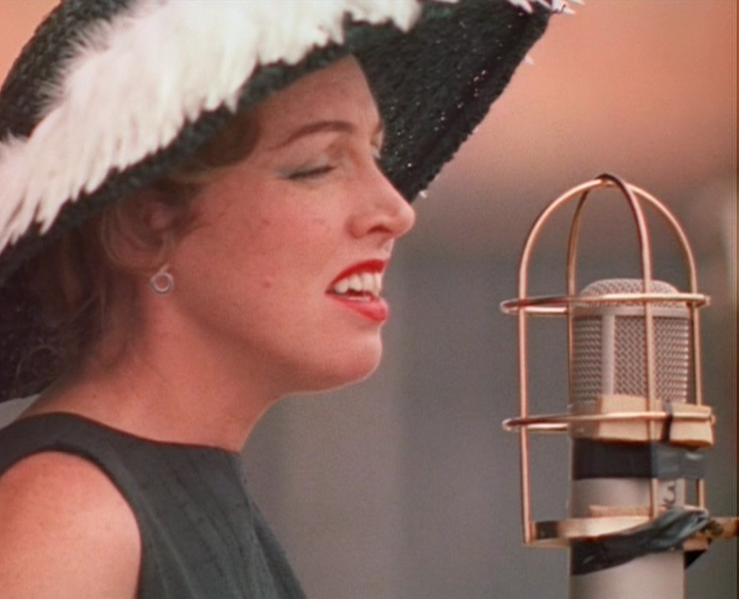ODAY (oh-DAY)
American
jazz singer
Common clues: Jazz
singer Anita; “The Jezebel of Jazz”; Scatter Anita;
Jazzy Anita; Anita of jazz; Jazz vocalist Anita
Crossword
puzzle frequency:
once a year
Video: Anita
O'day 'Sweet Georgia Brown' Live Performance
I knew I didn't have any chops, but I also knew I had a lot of heart ~ Anita O'Day
Anita O'Day (October 18, 1919 – November 23, 2006) was an American jazz singer. Jazz Critic Will Friedwald has said “When you think of the great jazz singers, I would think that Anita is the only white woman that belongs in the same breath as Ella Fitzgerald, Billie Holiday and Sarah Vaughan.”

Born Anita Belle Colton, O'Day was admired for her sense of rhythm and dynamics, and her early big band appearances shattered the traditional image of the "girl singer". Refusing to pander to any female stereotype, O'Day presented herself as a "hip" jazz musician, wearing a band jacket and skirt as opposed to an evening gown. She changed her surname from Colton to O'Day, pig Latin for "dough," slang for money.
O'Day, along with Mel Tormé, is often grouped with the West Coast cool school of jazz. Like Tormé, O'Day had some training in jazz drums (courtesy of her first husband Don Carter); her longest musical collaboration was with John Poole, a skilled jazz drummer whose career was severely curtailed by his heroin habit. While maintaining a central core of hard swing, O'Day's considerable skills in improvisation of rhythm and melody put her squarely among the pioneers of bebop; indeed, a staple of her live act in the 1950s was a smooth cover of "Four" by Miles Davis.
She cited Martha Raye as the primary influence on her vocal style, although she also expressed admiration for Mildred Bailey, Ella Fitzgerald, and Billie Holiday. O'Day's soft, slightly raspy alto voice bore a strong resemblance to that of a saxophone. That unique sound, combined with her strong percussive drive, allowed her to utilize her skills in scat singing to meld seamlessly into jazz orchestras as a wordless instrument; her cover of Woody Herman's "Four Brothers" is an excellent example. Another key example of her improvisational skills and rhythmic surety is her cover of "Them There Eyes" with Canadian jazz pianist Oscar Peterson; the song is laid out at a furiously fast tempo, but O'Day pushes the lyrics out at full speed for one chorus, scats another at a Cannonball Adderley pace, then playfully paraphrases the lyrics at half-tempo for her last chorus. O'Day's song interpretations typically reflected a sly, playful sensibility (see, for example, her cover of "An Occasional Man" with Cal Tjader's band, a much more sex-kittenish interpretation than that of Peggy Lee, among others).
O'Day always maintained that the accidental excision of her uvula during a childhood tonsillectomy left her incapable of vibrato, as well as unable to maintain long phrases. That botched operation, she claimed, forced her to develop a more percussive style based on short notes and rhythmic drive. However, when she was in good voice she demonstrated surprising skill at stretching long notes with strong crescendos and a telescoping vibrato, e.g. her stunning live version of "Sweet Georgia Brown" at the 1958 Newport Jazz Festival, captured in Bert Stern's film Jazz on a Summer's Day. Noteworthy is that one can hear on her records that her prominent upper teeth sometimes lead to her articulation of the "B" and the "P" as a "W" (f.i. Sweet Georgia "Wrown").
O'Day's cool, backbeat-based singing style was strongly influential on many other female singers of the late swing and bebop eras, including June Christy, Chris Connor and even less jazz-oriented performers such as Doris Day.
O'Day's long-term problems with heroin and alcohol addiction and her often erratic behavior related to those problems earned her the nickname "The Jezebel of Jazz".
This article is licensed under the GNU Free Documentation License. It uses material from the Wikipedia article "Anita_O'Day".
|
|